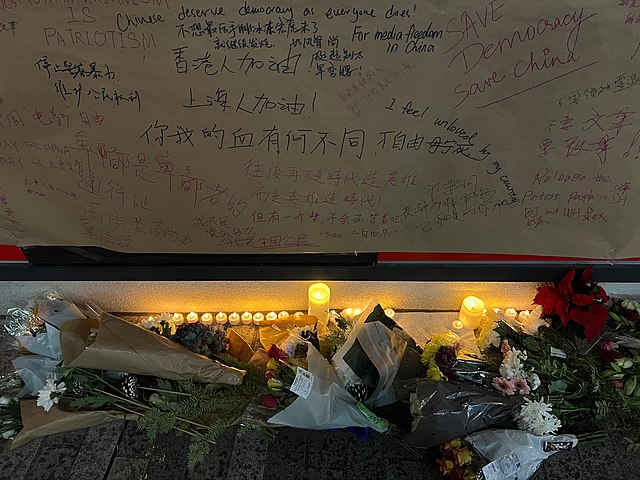Internal Pushback to China's Zero-Covid Regulations Indicates a Decrease in Ideological Power

LSE protest against zero-Covid policies on Friday, December 2, 2022.
Morgan Aikele- It’s been nearly three years since the start of the Covid-19 global pandemic, and China has spent that time fueling fears about the virus in order to encourage compliance with mass quarantines, testing, and tracking. The Chinese government has employed its considerable propaganda wing to psychologically reinforce its agenda. However, in the wake of protests rippling across China, calling for the loosening of Covid restrictions and the resignation of Chinese leader Xi Jinping, the Chinese government is witnessing a sharp challenge to the ideological power it has enjoyed these last three years.
Ideological power refers to the ability to get others to do what you want– this could be another country, entity, or a group of people. A powerful indicator of ideological power for a country is the willingness of others to accept its agenda without considering other options. In other words, going along with political actions because that is simply “what is done.” In this case, China has held considerable ideological power during the Covid-19 pandemic over its own citizens. In a country of nearly 1.5 billion people, government regulations have remained stringent and relatively unquestioned until recently. This compliance is largely credited to the government’s strong media campaign, which promotes messages “bordering on terror” regarding Covid, which they run through public officials and official newspapers run by the Communist Party. However, protests have erupted across the country in the last week, challenging the necessity of these policies. The government’s message is being challenged; the citizens of China are considering and acting upon other options, like protest, instead of acceptance and compliance alone. Thus, the Chinese government’s ideological power, or its ability to enforce an agenda with unquestioning adherence from others, is waning. The Chinese government recognizes this challenge and is relaxing Covid restrictions across the country. However, the government is working to maintain ideological power by suppressing news coverage of the protests. Instead, state media is filled with Chinese scientists reporting “new” research suggesting that Omicron is not as dangerous as previous variants. This gives the government a way to portray itself as responsive to science, rather than showcase a decrease in its ideological power in the face of public anger.
Understanding nationalism can further our understanding of the Chinese government’s efforts to enforce its agenda. China’s zero-Covid policy is not just reinforced by spreading fears about the virus, but also by illustrating the Chinese response to Covid as superior to those of other nations. Chinese leader Xi Jinping has urged the country to recognize that in the post-Covid era, the Chinese have adopted “order” while the West has adopted “chaos.” These kinds of statements reinforce a sense of Chinese national identity– that as a people, they are more orderly and responsible. This makes the government’s tight regulations more palatable, since they appeal to a proud sense of national identity.
Picture Credit: Photo distributed under the Creative Commons Attribution-Share Alike 4.0 International license. Source

